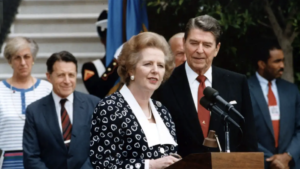Home » Commentary » Opinion » Thatcher, Reagan still point the way to a brighter future
· Financial Review

 Josh Frydenberg and I have a lot in common.We were born in the same year (1971). In the late 1980s and early ’90s, we represented our states in national sports (Josh, Victorian tennis; me, NSW athletics.) In 2009, we contested federal Liberal Party preselection (he convincingly won Kooyong in Melbourne; I narrowly lost Bradfield in Sydney).
Josh Frydenberg and I have a lot in common.We were born in the same year (1971). In the late 1980s and early ’90s, we represented our states in national sports (Josh, Victorian tennis; me, NSW athletics.) In 2009, we contested federal Liberal Party preselection (he convincingly won Kooyong in Melbourne; I narrowly lost Bradfield in Sydney).
We are, moreover, great admirers of Margaret Thatcher and Ronald Reagan, two of the greatest political leaders in modern history.
Speaking on the ABC’s Insiders on Sunday, the Treasurer said he drew inspiration from the British prime minister (1979-90) and US president (1981-89). The reason why Thatcher and Reagan were “figures of hate for the left”, Frydenberg argued, is because they successfully prosecuted economic reform in the 1980s.
The response was hostile: Opposition Leader Anthony Albanese, shadow treasurer Jim Chalmers, ALP president Wayne Swan and the ACTU leader Sally McManus were among others who claimed that praise for Thatcher and Reagan amounted to an attack on workers’ rights. Frydenberg immediately became a mob target on Twitter.
The Treasurer, of course, is right. Today, as the cause of economic reform appears quixotic, it is easy to forget how depressing things looked four decades ago and how the Thatcher-Reagan agenda led to a golden age.
When the Iron Lady and the Gipper came to power, social order was breaking down in parts of Britain and America and industry was in chaos. Excessive government regulation and bloated bureaucracies created a crisis of stagflation.
This free-market agenda meant that Britain, America and Australia bounced back from the depths of despair.
Worse still, Britain was widely regarded as the sick man of Europe (think Arthur Scargill’s union militancy) and the US was suffering a crisis of confidence (think Jimmy Carter’s “national malaise” sermon). At the same time, incidentally, Australia was an overregulated and overprotected nation, weighed down by chronic inflation (think Paul Keating’s “banana republic”.)
Under Thatcher and Reagan, tax cuts and deregulation ignited economic growth, created an astonishing new wave of prosperity and put a brake on the expansion of government that had seemed unstoppable during the 1970s era of stagflation.
In Australia it was Labor leaders Bob Hawke and Keating who kick-started the economic reform agenda. John Howard and Peter Costello continued it. As a result, Australia was transformed from a heavily protected closed shop into the envy of the industrialised world. We experienced a long boom (1992-2019) with low inflation, low unemployment and, according to the Productivity Commission, no great widening in inequality.
True, there were some reversals and setbacks: the US deficit ballooned under Reagan, but that was attributed to not just a failure to cut domestic spending but a dramatic defence build-up that, as Frydenberg points out, outspent the Soviet Union into submission.
However, by almost any economic criteria this free-market agenda of privatisation, deregulation, tax cuts and flexible labour relations meant that Britain, the US and Australia bounced back from the depths of despair.
The lesson here is self-evident: people respond to incentives; and high taxes interfere with natural human creativity and drive. Jobs and growth are not created by state paternalistic power, but by private enterprises free to invest and innovate by being taxed and regulated less. In other words, nations can’t tax themselves back to full employment.
The critics want a higher level of government intervention and control of the economy via higher taxes and regulation in order to address inequality. But that agenda is hardly fair. In responding to an MP’s complaint about income inequality, Thatcher argued: “The honourable gentleman is saying that he would rather that the poor were poorer, provided that the rich were less rich.” The reality is that policies to increase taxation and tightened regulations would make the poor poorer and thereby exacerbate income inequality.
By recalling Reagan and Thatcher, Frydenberg wants lower tax rates and lower regulation to bring higher growth and to help pay for some of the future education, health and welfare that society demands. Where do the critics expect to find the money in the post-COVID economy? You don’t tax a loss; you only tax a profit. Without profit – without capitalism – you cannot raise the revenue to provide for these public amenities.
Once the pandemic passes, responsible governments will need to champion a broad reform agenda that sharpens incentives to invest and create wealth. If they don’t, then the coming years could be grim beyond belief. Somewhere, Thatcher and Reagan would agree.
Thatcher, Reagan still point the way to a brighter future